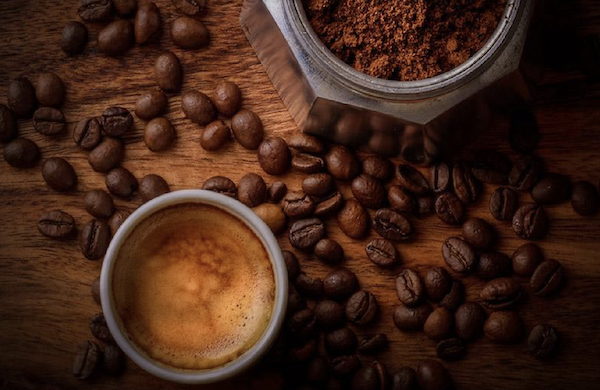Coffee benefits | is it healthy to drink coffee? Top 5 health puzzles
A number of studies have pointed out that coffee has a lot of benefits to the human body, but this is not necessarily the case. It has a lot to do with how many cups you should drink every day, whether you add milk, the age of drinking, and so on. The dietitian is teaching everyone to drink coffee correctly, so that everyone can taste the fun of coffee.

Myth 1: black coffee is good for your health, but is it true?
Dietitian Annie Lee points out that although in recent years, different studies have shown that drinking black coffee is good for the body, such as reducing the risk of heart attack [1]. But the study was not conducted in a comparative manner (dividing people into drinking coffee and not drinking coffee, and then comparing the risk of heart attack), it was just a clinical study.
Some studies have also pointed out that coffee can reduce the risk of liver disease and prevent cancer, but the subjects of the study are people who drink three or four cups of coffee a day, which is not the amount consumed by the average person.
As for studies showing that coffee can prevent diabetes, Li Xingyu dietitian said that such studies only cover people who do not have the disease, and people with diabetes are not included in the study, so the study may not reflect the real environment.
Myth 2: who is not fit to drink coffee?
Li Xingyu nutritionist pointed out that pregnant women are not suitable to drink too much coffee, otherwise it may lead to miscarriage or premature delivery. Coffee contains a substance called caffeine, although adults can easily break down caffeine, but due to the fetus's low ability to break down caffeine, if caffeine is delivered to the fetus through a pregnant woman, it may affect the fetus.
In addition, after children under the age of 12 drink coffee, their nerve center may be affected, making it difficult for them to fall asleep at night, so children should avoid drinking coffee and drink less coffee.
Myth 3: how many drinks can you drink a day?
The World Health Organization recommends no more than 300mg to 400mg of caffeine a day for adults, which is equivalent to five servings of standard espresso (expresso). Although pregnant women can drink coffee, it is recommended that they consume no more than 200 micrograms of caffeine a day and drink as little as possible so as not to affect the fetus. Teenagers between the ages of 13 and 18 consume no more than 100 micrograms. In general, the amount of hand-brewed coffee is 15g Arabica coffee beans, and the content of caffeine in each cup is about 60-90 mg. According to this amount, the daily consumption should not exceed 6-7 cups. If other coffee production methods are used, you can refer to the amount of beans used in each cup as conversion.
No matter who you are, you should not drink too much coffee. if you drink more than the recommended amount of coffee every day, it will increase the risk of calcium loss and the risk of fracture, especially for women.

Myth 4: is coffee with milk unhealthy? How to add milk?
Coffee with milk is a common way to drink, but dietitians warn that when hot coffee is added with milk, the temperature of the milk will rise to a range that is prone to bacteria, causing the milk to deteriorate quickly. To avoid this, it is recommended to use UHT-treated milk, which is safer to drink. As for cold coffee, there is no such problem.
Myth 5: does overroasting of coffee beans increase the risk of cancer?
Nutritionists point out that not only coffee beans, but also many baked foods in daily life, such as biscuits and barbecue, are likely to produce carcinogens after baking. In contrast, there are relatively few carcinogens in coffee beans, so it does not have much impact on the body, and we should not worry too much.
Reference research
[1] Choi, Y., Chang, Y., Ryu, S.A., Cho, J., Rampal, S.S., Zhang, Y.,... & Guallar, E. (2015). Coffee consumption and coronary artery calcium in young and middle-aged asymptomatic adults. Heart, 101 (9), 686691.
[2] Ruhl, C. E., & Everhart, J. E. (2005). Coffee and tea consumption are associated with a lower incidence of chronic liver disease in the United States. Gastroenterology, 129 (6), 1928-1936.
[3] Wilson, K. M., Kasperzyk, J. L.A., Rider, J. R., Kenfield, S.S., van Dam, R. M., Stampfer, M. J.,... & Mucci, L.A. (2011). Coffee consumption and prostate cancer risk and progression in the Health Professionals Follow-up Study. Journal of the National Cancer Institute, 103 (11), 876,884.
[4] Bhupathiraju, S.N., Pan, A.A., Malik, V. S.S., Manson, J. E., Willett, W. C., van Dam, R. M., & Hu, F. B. (2012). Caffeinated and caffeine-free beverages and risk of type 2 diabetes-. The American journal of clinical nutrition, 97 (1), 155,166.
Important Notice :
前街咖啡 FrontStreet Coffee has moved to new addredd:
FrontStreet Coffee Address: 315,Donghua East Road,GuangZhou
Tel:020 38364473
- Prev

Hand brewed coffee filter paper folding method diagram filter paper does not fit filter cup solution
Choosing a good filter cup is very important for brewing coffee, and the filter paper fits the filter cup more importantly, because if the filter paper does not fit the filter cup, the "grain" on the filter cup does not play its due role. Isn't it easy to fit filter paper to filter cup? But the devil hides in the details, some details are not in place, very
- Next

Is the oil from coffee beans not fresh? Is the oil leakage of coffee beans normal? How to brew so as not to be bitter?
It is said that history is a reincarnation. Forty years ago, coffee beans were beautiful with black and bright oil, but now it has become a problem that whether the oil from coffee beans is not fresh. Qianjie is going to explain to you today why some coffee beans have oil on the surface and some don't. We often find that the color of coffee beans with oil is better than that of coffee beans.
Related
- Beginners will see the "Coffee pull flower" guide!
- What is the difference between ice blog purified milk and ordinary milk coffee?
- Why is the Philippines the largest producer of crops in Liberia?
- For coffee extraction, should the fine powder be retained?
- How does extracted espresso fill pressed powder? How much strength does it take to press the powder?
- How to make jasmine cold extract coffee? Is the jasmine + latte good?
- Will this little toy really make the coffee taste better? How does Lily Drip affect coffee extraction?
- Will the action of slapping the filter cup also affect coffee extraction?
- What's the difference between powder-to-water ratio and powder-to-liquid ratio?
- What is the Ethiopian local species? What does it have to do with Heirloom native species?

